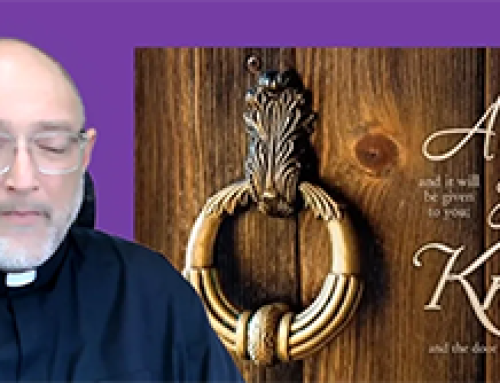Shane Hyland, Leader of School Evangelisation at St Joseph’s Regional College reads today from the Gospel of Luke (12: 54-59) in which Jesus says to the crowds, ‘You know how to interpret the face of the earth and the sky. How is it you do not know how to interpret these times?’
Shane says, in today’s Gospel, Jesus challenges the people to discern the signs of the times. He points out that they are skilled in predicting the weather based on the clouds and the wind, yet they fail to interpret the spiritual signs that are right in front of them. Jesus is criticising their inability, or unwillingness, to recognise Him as the Messiah despite the many miracles He has performed and the fulfilment of the prophecies concerning Him. He says, “You hypocrites! You know how to interpret the appearance of the earth and the sky, but why do you not know how to interpret this present time?”
The Pharisees knew intimately the Scriptures and the prophecies about the coming of the Messiah. Yet, they chose to harden their hearts and refuse to acknowledge Jesus as the Christ. Their rejection wasn’t due to a lack of evidence, but because Jesus did not fit into their preconceived ideas of what the Messiah would be. They were looking for a political saviour who would free them from Roman rule, not a suffering servant who came to redeem humanity from sin. In their pride, they preferred their own interpretation of the Law over the living Word of God standing right before them.
This passage is not just a historical critique of the Pharisees but a relevant warning for us today. Just as they failed to interpret the signs of their time, we can also miss the message of Jesus if we don’t make an effort to seek the truth for ourselves.
Many people base their understanding of Jesus on hearsay, cultural impressions, or the opinions of others without ever investigating the claims of Jesus by reading the Gospels and studying scripture for themselves. In an age where information is so readily available, it’s easier than ever to form opinions based on popular narratives, yet the need for personal discernment and judgement remains crucial.
Just as the people in Jesus’ time could forecast the weather, we live in a world where we have tools and knowledge to make well-informed decisions about many things—our health, finances, and even the environment. However, when it comes to spiritual matters, we often neglect to apply the same diligence.
Many avoid the question of who Jesus is, or they delay making a decision about Him, assuming there will always be more time. Jesus warns in this passage that there is urgency in settling matters with God, just as one would settle a legal dispute before being thrown into prison. The stakes are eternal, and judgement should not be put off.
Today, we are faced with the same choice as the Pharisees—either recognise Jesus for who He is or reject Him. The evidence is present in the Gospels, in the historical reality of His life, death, and resurrection, and in the transformed lives of those who follow Him. It requires personal reflection, an openness to the possibility that He is indeed the Son of God, and a willingness to let that truth transform your life.
Jesus is the promised Messiah, the Son of God, who came into the world to offer salvation to all who will accept it. His teachings, His miracles, and ultimately His resurrection affirm His divine nature and His mission to reconcile humanity with each other and to God.
In closing, Shane says, Jesus is the way, the truth, and the life (John 14:6), and His message continues to be relevant and life-changing for anyone who is willing to examine it and judge for themselves.






Leave A Comment